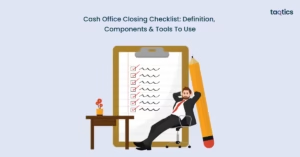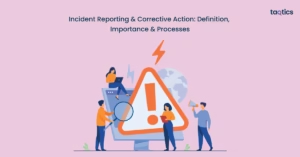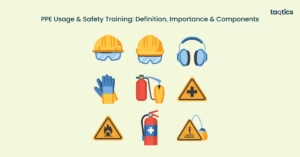Retail Task Management Software
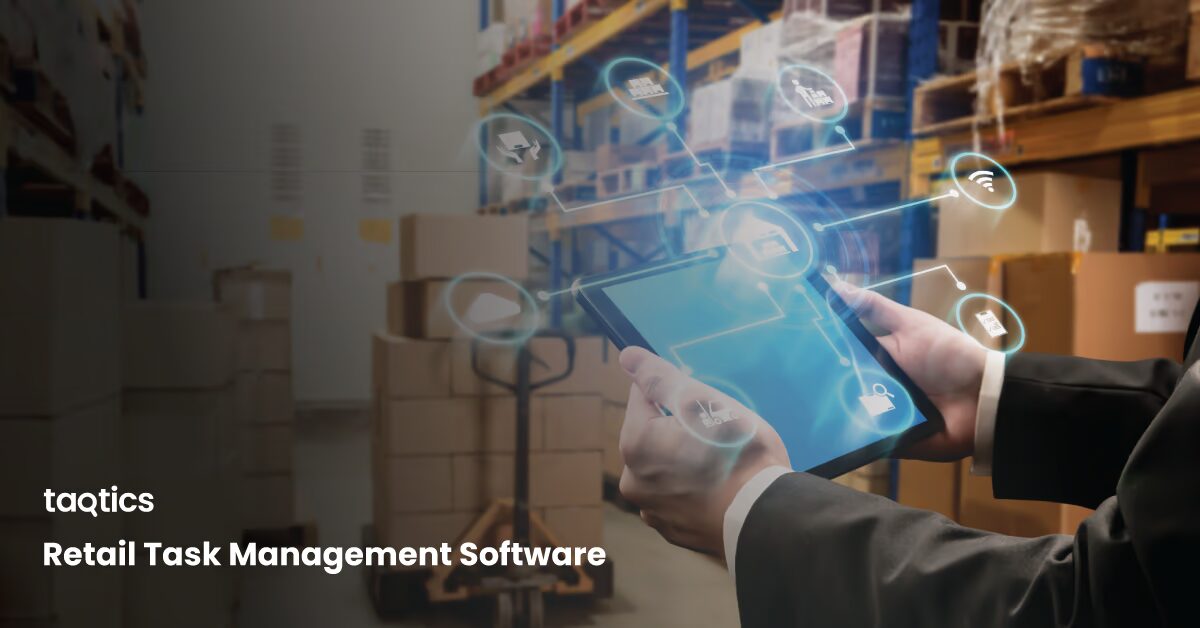
Retail task management software acts as a centralized platform to plan, assign, and monitor operational tasks across multiple store locations. Retail task management software enables seamless coordination between the head office and field teams, ensuring that initiatives like seasonal promotions, compliance audits, and merchandising standards are executed uniformly and on time.
A report by the Global Retail Task Management Software Market Research indicates that the market is projected to reach $3.135 billion by 2028, growing at a CAGR of 15.51% during the forecast period. This growth is attributed to the increasing demand for streamlined communication and task execution across multiple retail locations
With features like real-time updates, visual proof of task completion, and data-driven reporting, these platforms empower store managers to track progress, identify delays, and take timely corrective actions. This improves accountability and significantly shortens issue resolution times.
By investing in a robust task management system, retailers not only streamline operations but also gain deeper visibility into store-level performance, driving smarter decisions and higher customer satisfaction. In an environment where consistency is key, such software becomes an operational backbone for retail success.
What is Retail Task Management Software?
Retail task management software is a digital solution designed to streamline and organize the daily operations and responsibilities within a retail environment. Retail task management software allows store managers and employees to assign, track, and complete tasks efficiently across multiple locations, ensuring consistent execution of company standards, promotions, and customer service practices.
This software typically includes features such as task assignment, real-time progress tracking, automated reminders, mobile access, and performance analytics. It helps eliminate communication gaps, reduces human error, and improves overall productivity and accountability in retail teams.
Suppose a national retail chain uses task management software to roll out a new product display across 500 stores. The software sends detailed instructions and deadlines to each store, tracks task completion, and allows managers to monitor execution in real time, ensuring uniformity and timely setup across locations.
Retail environments are dynamic and fast-paced. Without a structured system, important tasks like merchandising, compliance checks, or promotional setups can be missed or inconsistently executed. Retail Task Management Software ensures that all team members are aligned with corporate expectations, deadlines are met, and store performance is optimized. It also provides visibility for management into what is being accomplished at the store level.
Why Task Management is Essential in Retail Operations?
Task management is essential in retail operations for six major reasons, which include operational consistency, improved efficiency, real-time visibility, accountability, faster issue resolution, and enhanced communication.
- Operational Consistency: Ensures all stores follow the same processes, leading to a unified brand experience.
- Improved Efficiency: Helps employees prioritize and manage tasks, reducing confusion and saving time.
- Real-Time Visibility: Provides managers with insights into task progress and completion across locations.
- Accountability: Tracks who is responsible for each task, encouraging ownership and timely execution.
- Faster Issue Resolution: Enables quick identification of delays or problems, allowing for immediate action.
- Enhanced Communication: Facilitates clear, consistent instructions between corporate teams and store staff.
By implementing effective retail task management, retailers can boost productivity, maintain store standards, and improve overall customer satisfaction, giving them a competitive edge in the market.
Key Features of Retail Task Management Software
The key features of retail task management software are task assignment and scheduling, mobile access and real-time updates, photo proof and documentation features, customizable checklists and templates, communication and collaboration tools, reporting and analytics dashboard.
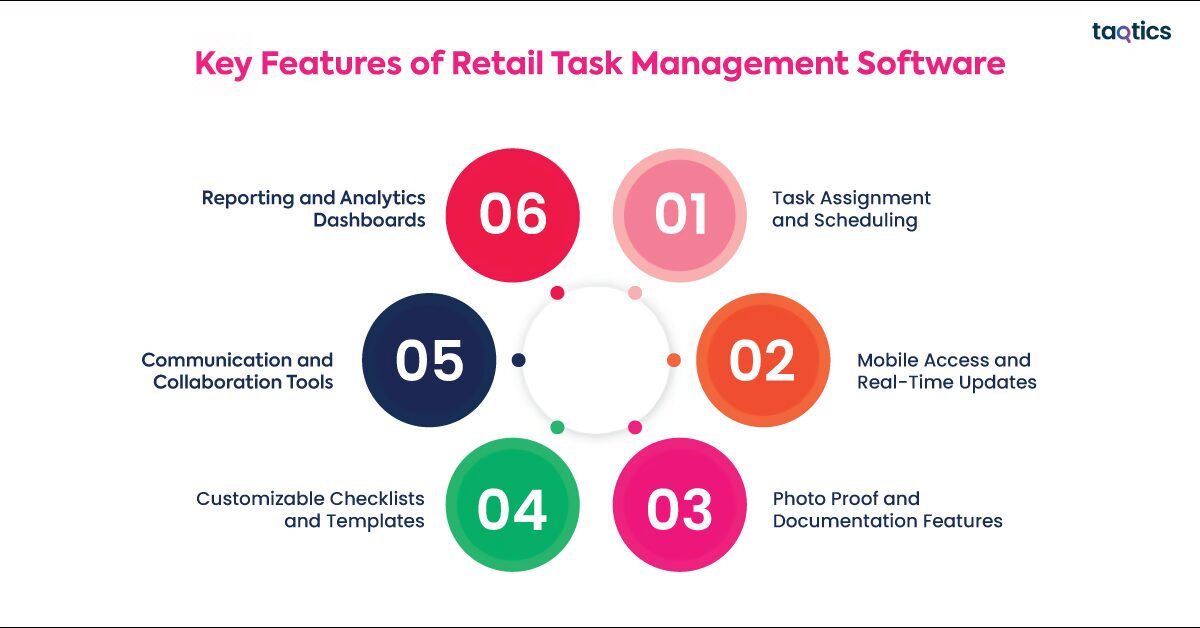
Task Assignment and Scheduling
Managers can create and ensure retail task assignment and store task scheduling with specific deadlines, ensuring timely completion and adherence to Standard Operating Procedures (SOPs).
Mobile Access and Real-Time Updates
The mobile store task management app provides store teams with immediate access to tasks, checklists, and updates, facilitating efficient task execution and communication.
Photo Proof and Documentation Features
Employees can upload time-stamped photos and videos as evidence of task completion, ensuring transparency and accountability.
Customizable Checklists and Templates
Taqtics allows for the creation of tailored retail task checklists and templates, accommodating the unique needs of various retail operations.
Communication and Collaboration Tools
Integrated messaging and noticeboard features enable seamless communication management among team members, promoting collaboration and information sharing.
Reporting and Analytics Dashboards
Real-time dashboards and automated reports in formats like Excel, PDF, and PPT provide actionable insights, aiding in performance monitoring and decision-making.
Taqtics is a software that offers a comprehensive suite of features designed to streamline retail operations and enhance team productivity. These collectively empower retail businesses to optimize operations, maintain consistency, and enhance overall performance.
How to Choose the Right Task Management Software for Retail?
To choose the right task management software for retail franchises, businesses must assess it from eight aspects.
- Ease of Use: The software should be intuitive and user-friendly, enabling quick adoption by store teams with minimal training.
- Mobile Accessibility: Ensure the platform offers a mobile app so tasks can be accessed and updated on the go, especially by frontline staff.
- Customizable Checklists and Templates: Look for software that allows you to create and edit checklists based on specific store needs and operations.
- Real-Time Updates and Notifications: Features like live task tracking and automated reminders help teams stay on schedule and responsive to changes.
- Photo and Document Uploads: The ability to attach images or files as proof of completion ensures transparency and accountability.
- Robust Reporting and Analytics: A strong reporting system helps track performance, identify trends, and make data-driven decisions.
- Integration Capabilities: Choose a solution that integrates well with existing systems like POS, HR, or inventory management.
- Customer Support: Reliable customer service and onboarding support are essential for long-term success.
Evaluating these features will help you select a tool that aligns with your retail goals and operational complexity.
How to Implement Retail Task Management Software?
To implement retail task management software, businesses must follow a series of seven steps.
- Assess Business Needs: Identify your operational challenges and goals to determine what features are essential, such as task tracking, mobile access, or reporting tools.
- Choose the Right Software: Select a platform that fits your business size, workflow, and budget. Ensure it offers scalability, ease of use, and integration with existing systems.
- Plan the Rollout: Define a clear implementation timeline. Start with a pilot rollout in a few stores to test functionality and gather feedback.
- Set Up Tasks and Templates: Create task templates and checklists tailored to your daily operations, promotional campaigns, audits, and SOPs.
- Train Staff: Conduct training sessions for both managers and frontline staff to ensure they understand how to use the software effectively.
- Monitor and Support: Provide ongoing support and monitor usage. Encourage feedback and resolve issues quickly to maintain momentum.
- Measure and Optimize: Use built-in analytics to track task completion rates, identify bottlenecks, and continuously improve processes.
A structured implementation ensures smooth adoption and long-term success with your task management system.
Compare Retail Task Management Software
We have compared different retail task management software, namely, Taqtics, Yoobic, Opscenter, WorkJam, Paso, and Lark in the tabular format below.
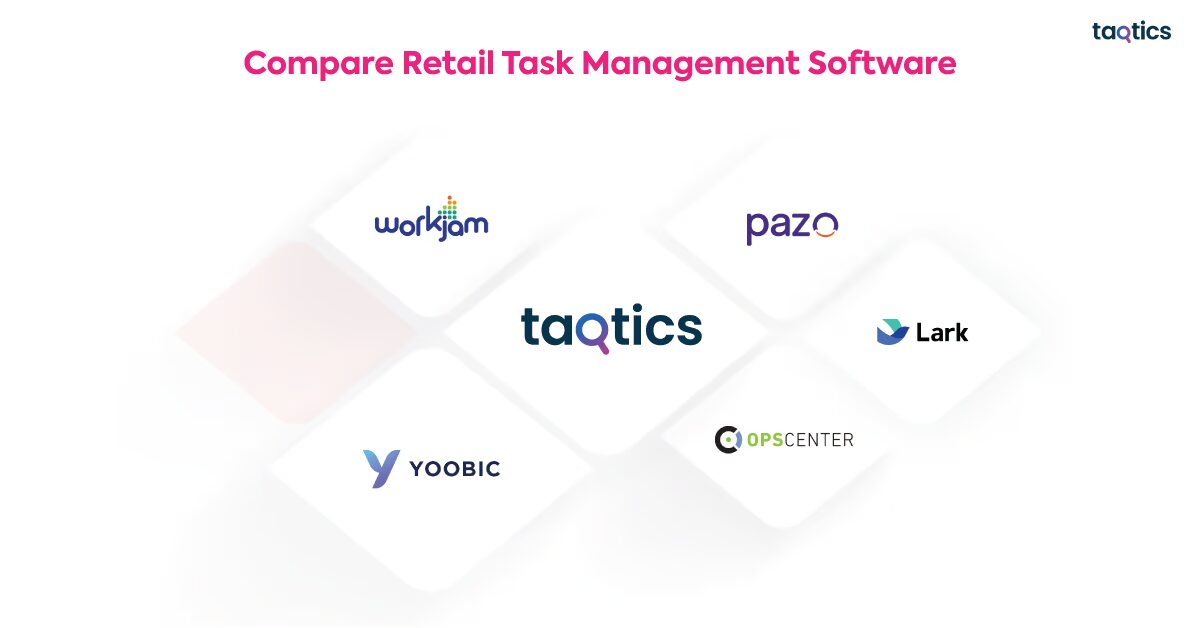
| Feature | Taqtics | Yoobic | Opscenter | WorkJam | Paso | Lark |
| Task Assignment & Scheduling | Customizable checklists, scheduling, and geo-fenced attendance. | AI-powered task creation, role-based targeting, and automated workflows. | Centralized task management with scheduling and tracking. | Assign tasks based on skills and schedules; supports subtasks. | Task creation with scheduling and tracking. | Task assignment and scheduling integrated with communication tools. |
| Mobile Access & Real-Time Updates | Mobile app with real-time dashboards and notifications. | Mobile-first design with offline access and push notifications. | Mobile access with real-time updates. | Mobile app with real-time tracking and updates. | Mobile access with real-time updates. | Mobile access with real-time updates. |
| Photo Proof & Documentation | Live photo attachments for tasks and issues. | Photo feedback view with annotations for task completion. | Photo documentation for tasks and audits. | Photo proof of task completion; integrates with other systems. | Photo documentation for tasks. | Photo documentation integrated with communication tools. |
| Customizable Checklists & Templates | Create, schedule, and assign ad-hoc or periodic checklists. | Templates and AI-generated content for tasks and campaigns. | Customizable templates for tasks and audits. | Customizable templates for tasks and workflows. | Customizable templates for tasks. | Customizable templates integrated with communication tools. |
| Communication & Collaboration | Noticeboard for company-wide announcements; messaging features. | Real-time newsfeed with live video and community engagement. | Centralized communication tools for teams. | Integrated messaging and collaboration features. | Communication tools integrated with task management. | Integrated communication tools within the platform. |
| Reporting & Analytics Dashboards | Real-time dashboards with automated reports in Excel, PDF, and PPT formats. | Customizable dashboards with real-time insights and trend analysis. | Reporting tools for task and audit performance. | Comprehensive reporting with real-time insights. | Reporting tools for task performance. | Integrated analytics within the platform. |
What is the Best Software for Retail Task Management?
Taqtics is the best software for retail task management with six distinct features, which include digital SOP checklists, store audits and reports, visual merchandising execution, issue tracking, attendance management, and knowledge centre.
- Digital SOP Checklists: Taqtics allows for the creation, scheduling, and assignment of ad-hoc or periodic checklists, ensuring store teams know what to do and when to do it. Features include live photo attachments, multi-lingual support, and real-time dashboards.
- Store Audits & Reports: The platform enables digitized and scheduled audits with pre-defined scoring to generate automated reports and corrective action requests, enhancing compliance and operational standards.
- Visual Merchandising Execution: Taqtics facilitates the sharing of VM guidelines and reviews in-store executions via visual reports that are downloadable in PPT and PDF formats, ensuring brand consistency.
- Issue Tracking: Store teams can report store-wide issues promptly, with features like live photo attachments, multi-department setup, email notifications, and real-time dashboards, ensuring swift resolutions.
- Attendance Management: Utilizing GPS-based clock-ins and clock-outs, Taqtics provides visibility into company-wide work hours, with geo-fenced attendance and leave application features.
- Knowledge Centre: The platform offers mobile-based learning via bite-sized modules, assessments, and gamified leaderboards, enhancing employee training and engagement.
With its user-friendly interface, comprehensive features, and seamless integration across devices, Taqtics empowers retail businesses to optimize operations, maintain store standards, and improve overall customer satisfaction.

